The Future by Nick Montfort

Author:Nick Montfort
Language: eng
Format: epub, pdf
Tags: futurism; world's fair; futurama; utopia; science fiction; design; internet history; imagination
Publisher: The MIT Press
Published: 2017-12-18T05:00:00+00:00
Vannevar Bush’s Memex
Among other distinctions, Vannevar Bush developed an important analog computer, served as the first dean of engineering at MIT, headed the Carnegie Foundation, and went on to work as President Franklin Delano Roosevelt’s science advisor during World War II. He worked, perhaps harder than anyone else, to establish what would be called, years later, the military-industrial complex. This configuration has also been called the military-industrial-academic complex, as the research and teaching that happens in universities is an important component of it.
While Bush’s early analog computer, the differential analyzer, was an important invention, his most influential invention was described in a popular article but never completely constructed and tested. It also did not explicitly involve a computer, even of the analog sort. This was the Memex, which Bush envisioned beginning in the 1930s but described most fully in The Atlantic Monthly in July 1945, in an article entitled “As We May Think.” (An abridged version of the article was reprinted later that year, with striking illustrations, in Life.) Bush admired Allied scientists for coming together during the war for a common cause; he also saw a need for a peacetime project to provide a way to continue this collaboration that would advance humanity. The Memex, a system to advance knowledge, extend the library, and further collaboration among scholars, was his proposal for a type of Manhattan project that, instead of being weaponized, would be oriented toward the peaceful advance of knowledge.
Bush’s Memex system included user-interface advances for researchers—the “scientist of the future”—but also an architecture, a sketch of a protocol, and server-side mechanisms for information storage and retrieval. One critical technology that would enable the system, Bush explained, was photography. Wearing a camera at all times, researchers would be able to casually photograph any object of interest, “without even an audible click,” a capability finally provided about seventy years later by Google Glass and Snapchat Spectacles. Bush also saw advances in dry photography (later called xerography) and microphotography as being essential to the Memex; of course, these technologies did become very important to information transmission and storage.
Bush looked for other ways to facilitate the intake of information, also proposing a speech recognition system—accomplished by a combination of the Voder speech-synthesis system and stenographic recording—to allow hands-free commentary, which could be provided by a researcher while this person took photographs with the envisioned wearable camera. Among other things, Bush suggested that we might learn to write numerals in a more machine-readable way to facilitate data entry; the trace of this idea can be seen in the human- and machine-readable OCR-A font from the late 1960s, still in use on checks, and the shorter-lived Graffiti handwriting recognition system in Palm personal digital assistants.
All these are part of the Memex vision, and the overall system, but the interface that has become most emblematic of the system is the desk, depicted in Life in marvelously mechanical form, with seemingly functional file drawers underneath its complex mechanisms. The desk provided a way to consult
Download
This site does not store any files on its server. We only index and link to content provided by other sites. Please contact the content providers to delete copyright contents if any and email us, we'll remove relevant links or contents immediately.
| Anthropology | Archaeology |
| Philosophy | Politics & Government |
| Social Sciences | Sociology |
| Women's Studies |
Cecilia; Or, Memoirs of an Heiress — Volume 1 by Fanny Burney(32558)
The Great Music City by Andrea Baker(32019)
Cecilia; Or, Memoirs of an Heiress — Volume 2 by Fanny Burney(31956)
Cecilia; Or, Memoirs of an Heiress — Volume 3 by Fanny Burney(31942)
We're Going to Need More Wine by Gabrielle Union(19046)
All the Missing Girls by Megan Miranda(16029)
Pimp by Iceberg Slim(14508)
For the Love of Europe by Rick Steves(14121)
Bombshells: Glamour Girls of a Lifetime by Sullivan Steve(14076)
Talking to Strangers by Malcolm Gladwell(13370)
Norse Mythology by Gaiman Neil(13365)
Fifty Shades Freed by E L James(13241)
Mindhunter: Inside the FBI's Elite Serial Crime Unit by John E. Douglas & Mark Olshaker(9343)
Crazy Rich Asians by Kevin Kwan(9292)
The Lost Art of Listening by Michael P. Nichols(7506)
Enlightenment Now: The Case for Reason, Science, Humanism, and Progress by Steven Pinker(7313)
The Four Agreements by Don Miguel Ruiz(6765)
Bad Blood by John Carreyrou(6622)
Weapons of Math Destruction by Cathy O'Neil(6281)
